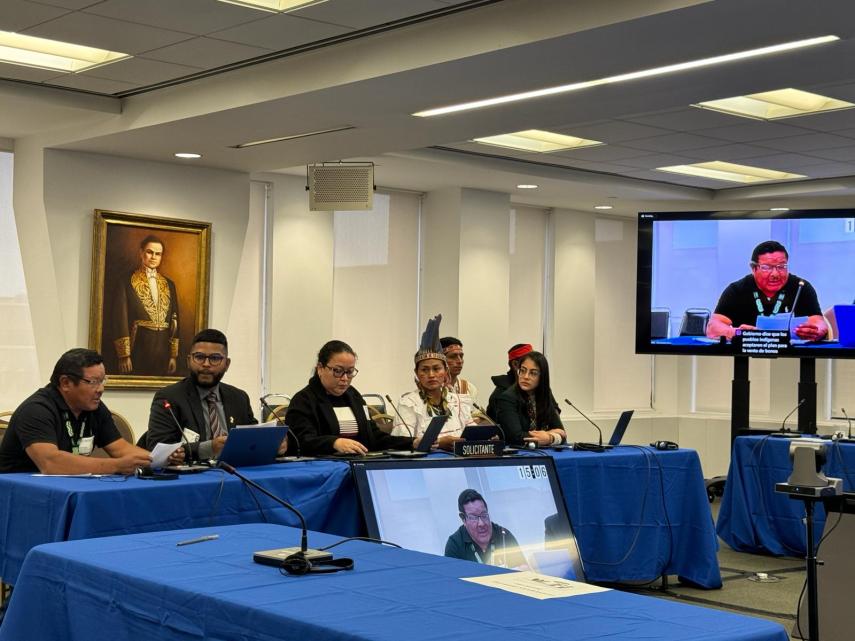Indigenous and Afro-descendant peoples alert IACHR to human rights and territorial violations by carbon markets in Latin America
On 28 February 2024, leaders of Indigenous and Afro-descendant peoples and civil society representatives from Peru, Colombia, Guyana and Brazil participated in a thematic hearing organised by the Inter-American Commission on Human Rights (IACHR or Commission) to highlight violations of their rights and collective territories due to the expansion of carbon markets and to call on the Commission to provide greater oversight of this issue.
The regional thematic hearing, entitled Impact of the carbon market on indigenous peoples and local communities, took place on 28 February 2024 in Washington, DC during the 189th session of the IACHR.
Read the report presented to IACHR (Spanish only)
Civil society participants included: Flávia Silva dos Santos, Quilombola leader of the Rio Genipaúba Community, in the state of Pará, Brazil, and lawyer for the Coordinating Committee of the Associations of the Remaining Quilombo Communities of Pará (MALUNGU); a delegation from the Kichwa people of San Martín in Peru, represented by apu (leader) Marisol García Apagüeño, representing the Indigenous organisations FEPIKECHA, FEPIKBHSAM, CEPKA and CODEPISAM, together with lawyer Cristina Gavancho from the Instituto de Defensa Legal (IDL); Mario Hastings, Toshao (leader) of the Kako community of the Akawaio people and Lakhram Bhagirat, communicator of the Amerindian Peoples Association (APA), Guyana; Paulo Ilich Bacca, lawyer and deputy director of DeJusticia and Julián Trujillo Guerrero, lawyer of Gaia Amazonas, both technical advisors to the Indigenous Council of Pirà-Paraná in the department of Vaupés, Colombia; and Ana Elisa Samayoa and Daniel Cerqueira of the NGO Due Process of Law Foundation (DPLF), and Lara Domínguez Rush, Lan Mei and Oda Almås-Smith of Forest Peoples Programme (FPP). In addition, the delegations were supported by the NGOs Amazon Watch and Instituto Socioambiental (ISA) from Brazil.
The Commission was represented by: Roberta Clarke (Commissioner and chair of the hearing), Gloria de Mees (Commissioner and Rapporteur on the Rights of Afro-Descendants and against Racial Discrimination), Edgar Stuardo Ralón (Commissioner and Rapporteur for Peru), Pedro Vaca (Special Rapporteur on freedom of expression), Javier Palummo (Special Rapporteur on economic, social, cultural and environmental rights), María Claudia Pulido (Deputy Secretary of the Commission).
Brazil
"We are the resistance and the living presence of our ancestry." Flávia Silva dos Santos, MALUNGU lawyer, Brazil.
Flávia dos Santos detailed the violations that carbon programmes and projects have meant for Quilombola communities in the state of Pará in Brazil. She highlighted, in particular, the risk that private companies - most of which are not based in Brazil and operate in the voluntary carbon market - pose to their communities. She detailed how these market actors enter communities by harassing leaders to sign carbon offset contracts that infringe on their land rights, undermine their food sovereignty, and pose a serious risk to their survival. She stressed that these contracts are entered into without consulting the communities in whose territories they are developed and without accountability or transparency of information, as many contracts are in foreign languages.
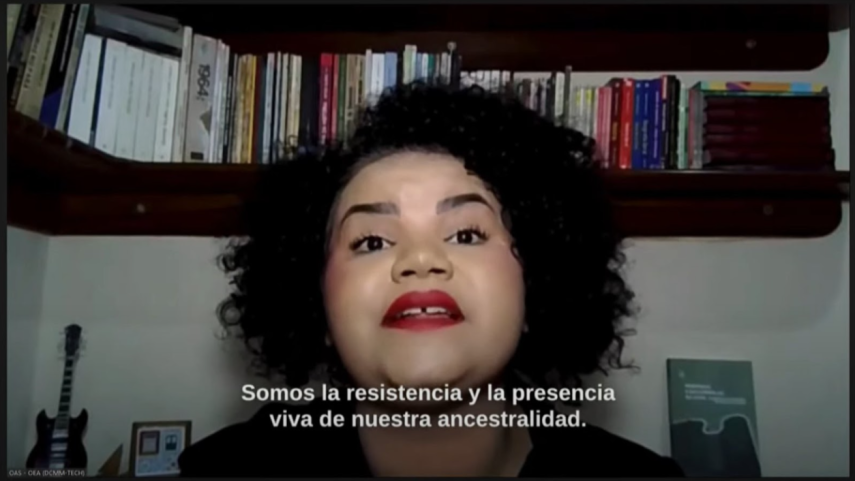
"The proposals for carbon credit contracts in the voluntary market do not offer effective mechanisms for environmental conservation, while at the same time they turn nature in our territories into a commodity that can be traded around the world without us having control over this market," she said.
She also emphasised that it is often state entities themselves that do not comply with the rights of Indigenous and Afro-descendant communities, highlighting the shortcomings of the Brazilian regulatory framework in the face of the expansion of these markets.
Peru
"We reject false nature based solutions and carbon neutrality that only serve for companies to greenwash their image before society whilst on the other hand promoting and rewarding the dispossession of our territory". Marisol García Apagüeño, President of FEPIKECHA, Peru.
In the section on Peru, Marisol García explained how the creation of the Cordillera Azul National Park (PNCAZ) and its exclusionary conservation project have been carried out behind the backs of the Kichwa communities of San Martín and ignoring collective rights that are linked to their ancestral territory. She also discussed the impacts that the PNCAZ and the REDD+ project that CIMA is managing in the Park have had on the Kichwa communities (including impacts on their livelihoods, the lack of recognition of their territorial rights, the lack of consultation and participation in decision-making, and the lack of access to information, transparency and accountability).
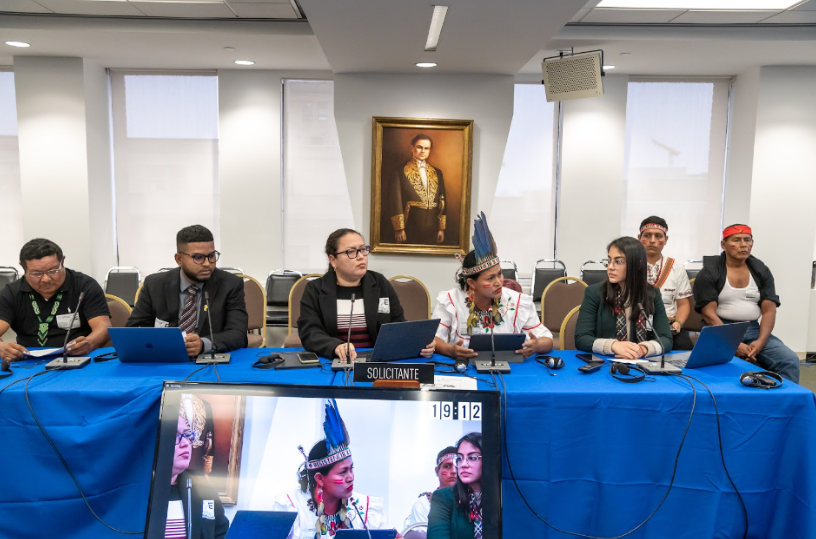
She emphasised that the Kichwa communities continue to receive no economic benefits despite the sale of millions of carbon credits from the PNCAZ to polluting companies such as Total Energies. She also questioned how the Park's managers and the companies that buy PNCAZ offsets to launder their image define "benefits", without taking into account the views of the Kichwa communities that have protected these territories for hundreds of years.
She made it clear that what the Kichwa communities are asking for, above all, is the recognition of their ancestral territories: "The Kichwa people demand that the Peruvian state comply with its own norms and international conventions and demarcate our ancestral territories that were stolen by the Cordillera Azul Park and we ask that the Peruvian state regulate and oversee the REDD+ Project".
Guyana
“We have not seen any proof that selling carbon is helping Mother Earth. Even though the Government is selling carbon credits and promising to keep the trees standing, they continue to give out mining concessions without caring about destruction of our forests." Mario Hastings, Akawaio leader, Upper Mazaruni, Guyana
Lakhram and Mario detailed how the state of Guyana failed to adequately consult with Indigenous peoples before embarking on a jurisdictional REDD+ programme involving the sale of millions of carbon credits from forests across the country. They questioned the sale of these credits to polluting companies such as the oil company Hess supposedly to "protect" the forest when the state continues to grant mining concessions in Indigenous territories without their consent. They also emphasised that although some communities have welcomed receiving benefits, they did not participate in the design of the benefit-sharing plan and were not able to tell the Government what they consider appropriate compensation for having all their forests included in the national carbon scheme.
"We just learned today that ART has now issued a further 7.14 million carbon credits to Guyana for the year 2021. In its announcement today, ART claims that indigenous peoples were consulted on the Government’s REDD+ initiative and are benefiting from it." Lakhram Bhagirat, APA.
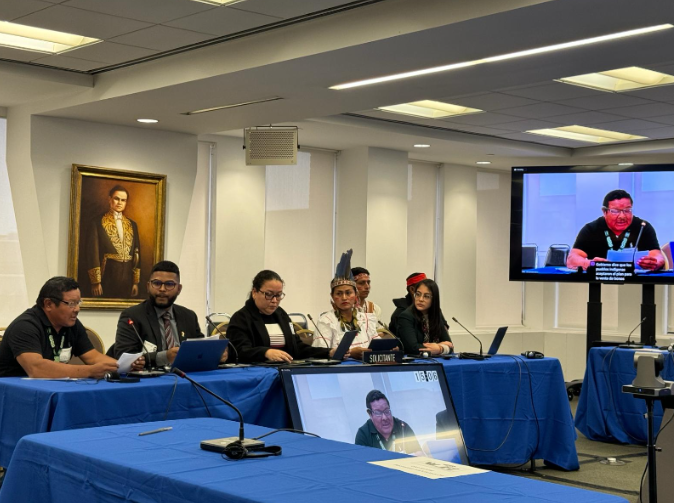
This is why APA filed a complaint with the certifier of the carbon credit programme in Guyana (ART TREES). Unfortunately, this entity did not comply with international standards in the procedure that followed, so the complaint was dismissed. This highlights the ineffectiveness of these domestic grievance mechanisms in safeguarding the rights of communities affected by such projects.
“ART failed to engage in good faith with information about problems with Guyana’s jurisdictional REDD+ program that were presented to it, especially during the complaint and subsequent appeal processes. The first test in the world of ART’s grievance mechanism shows that it fails to implement the UN Guiding Principles on Business & Human Rights... And it failed to lead to outcomes aligned with international human rights law,” Lakhram stated.
Colombia
"The main problem with REDD+ is that the model in general and the projects in particular ignore the fundamental role that Indigenous peoples play in protecting life on the planet." Julián Trujillo, Gaia Amazonas.
DeJusticia and Gaia Amazonas lawyers Paulo and Julián presented on the lawsuit that the Indigenous Council of the Pirà-Paraná River brought before the Colombian Constitutional Court requesting the cancellation of a contract for the sale of carbon credits signed by a private developer of carbon credit projects and an individual claiming to represent the community. The latter, however, was not a legal representative of the Indigenous council, nor did he have the authority to sign such a contract on behalf of the Pirà-Paraná communities.
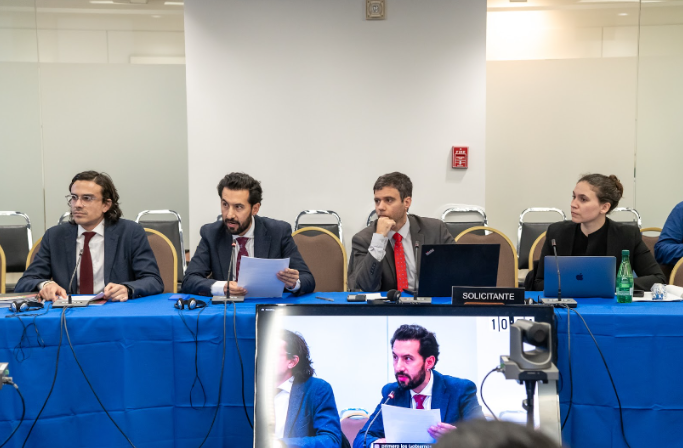
"The Indigenous territory of Pirá Paraná has been affected by the formulation, development and commercialisation by the Corporation for the Sustainable Management of Forests (Masbosques), and others, of a project that was not authorised by the Indigenous government".
They contextualised that these projects are often imposed from outside, replicating a colonial model of intervention in Indigenous communities. They highlighted how the project in question had an impact on the territorial governance of the affected communities - particularly in the face of the pressure exerted by the project managers to reduce the areas under cultivation - and the intra-ethnic conflicts that the project generated within these communities.
They also highlighted the lack of effective regulatory frameworks to safeguard the rights of Indigenous peoples in the sale of carbon credits in Colombia.
Greater regulation of carbon markets and respect for Indigenous self-determination
Following the conclusion of the country submissions, IDL lawyer Cristina Gavancho made the following requests to the Commission:
- Prioritise the processing of petitions and cases that are linked to climate justice in general and, in particular, to Indigenous peoples and local communities whose rights have been violated by actions taken to address global warming.
- The Special Rapporteurship on Freedom of Expression (RELE) should develop concrete standards and promote specific state policies on the rights of access to information, transparency and participation in the processes of certification and registration of the sale of carbon credits.
- The Special Rapporteur on Economic, Social, Cultural and Environmental Rights (REDESCA) should (i) develop a specific line of work on the impact of carbon markets on the rights of Indigenous and tribal peoples and (ii) research and publish a report on the impact of so-called "green finance" initiatives on Indigenous peoples.
- Incorporate the issue of carbon markets in its Annual Report and in the annual reports of its RELE and REDESCA.
- Issue a new resolution on the protection of human rights in the context of green finance initiatives.
- Urge states in the region to: (i) adopt effective regulatory frameworks for the certification, registration and trading of carbon credits; and (ii) establish a roadmap to guarantee the right to self-determination and free, prior and informed consent of Indigenous peoples in the carbon credit market.
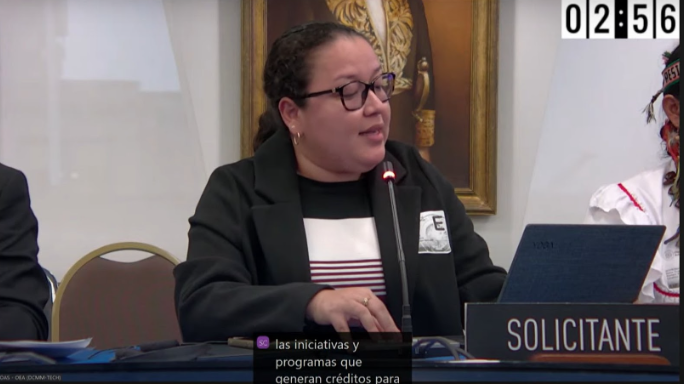
During the hearing, several of the commissioners asked questions to the speakers to elaborate on the information provided during their interventions. The IACHR recognised the importance of adopting measures to regulate the sale of carbon credits in the region and committed to include this issue in its work plan, exploring actions to serve as a guide for states.
Other advocacy processes related to rights violations by the Cordillera Azul National Park and the situation of indigenous human rights defenders in Peru
The delegations present in Washington, DC for the hearing also took advantage of their stay to hold a number of related meetings.
Amazon Watch organised a civil society event for hearing speakers, including apu Isidro Sangama Sangama of CEPKA and youth leader Carlos Deivis Lozano of FEPIKECHA, to raise awareness of the situation of Indigenous peoples in the face of expanding carbon markets in Latin America.
The Peruvian and Colombian delegations also had the opportunity to meet with USAID, a US government agency that funds development and conservation projects around the world. The Kichwa delegation wanted to find out why they had funded actions by the Cordillera Azul National Park and the Cordillera Escalera Regional Conservation Area in the San Martin region that violated their rights, and how and what safeguards mechanisms they had implemented or would implement to address this situation.
The Kichwa leaders went in person to the offices of Verified Carbon Standard (Verra) - one of the certifiers that has certified carbon credits sold by CIMA in the PNCAZ - to present a report on how the REDD+ project has seriously violated their fundamental rights. Although there was no one in Verra's office to receive them, staff from the certifier contacted the federations by email to acknowledge receipt of the report. Verra, reaffirming their commitment to take the allegations mentioned in the report very seriously, have committed to study it carefully and will contact the Kichwa federations to follow up.
In general terms, the Kichwa ask Verra to suspend the issuance of new credits from the PNCAZ REDD+ Project until a full investigation is carried out, including a special technical mission to the Kichwa communities in coordination with their representative organisations, and until the free, prior and informed consent of these communities is obtained. And publicly acknowledge the shortcomings of the PNCAZ's REDD+ Project certifications, especially in relation to transparency, access to information and respect for the territorial rights and self-determination of Indigenous peoples.
The Kichwa leader Marisol also intervened during a thematic hearing on the situation of human rights defenders in the continent on 29 February, organised by AIDESEP. In this space, she was able to highlight the lack of effective protection that defenders of Indigenous peoples receive from the Peruvian authorities, mentioning the recent murder of Apu Quinto Inuma.
Links
- Informe a la CIDH
- Video de la audiencia
- Comunicado de la CIDH
- Presentación de APA
- Presentación de DeJusticia y Gaia Amazonas
- Informe a VERRA



